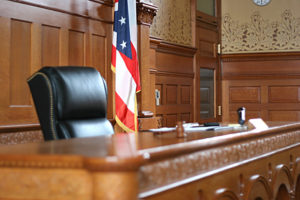An Appellate Case Concerning Fines and Fees
Chicago Appleseed and Chicago Council of Lawyers have been advocating for reform to Illinois’ system of imposing court fees, costs and fines on defendants and civil litigants for years. The systems are burdensome and arbitrary, and unfairly fund the costs of trial by burdening the state Constitutional right of free access to justice. Our report, its attachment A (chart of mandatory and discretionary court costs, fines, and fees), and the executive summary, explain our position in full.
 The fight has become more urgent with the Appellate Court’s recent decision in People v. Lovelace which holds there is no abuse of discretion in retaining 10% of the bond money posted, plus the costs of electronic monitoring, following the acquittal of a defendant without an accounting or specific justification for withholding the maximum amount. In Lovelace, the court retained a staggering $35,000 in bond processing fees (10% of the $350,000 posted), and an additional $5,433.75 in electronic monitoring fees. The Appellate Court also rejected various due process and other Constitutional challenges.
The fight has become more urgent with the Appellate Court’s recent decision in People v. Lovelace which holds there is no abuse of discretion in retaining 10% of the bond money posted, plus the costs of electronic monitoring, following the acquittal of a defendant without an accounting or specific justification for withholding the maximum amount. In Lovelace, the court retained a staggering $35,000 in bond processing fees (10% of the $350,000 posted), and an additional $5,433.75 in electronic monitoring fees. The Appellate Court also rejected various due process and other Constitutional challenges.
While at first glance the circumstances of Lovelace may appear unique, they are merely an exaggerated example of the current regime of fines, fees, and costs violating the core principle of free access to justice as embodied in the Illinois Constitution’s Bill of Rights. Chicago Appleseed and Chicago Council of Lawyers believe these court debts are administratively inefficient, as well as arbitrary and an improper means of shifting the costs of a functioning justice system onto the people the government chooses to prosecute. The Lovelace decision illustrates that meaningful court costs, fines, and fees reforms must include protection for acquitted people as well as those who are convicted.
We hope the ruling in Lovelace does not stall movement to reform the system of court fines, fees and costs in Illinois. Chicago Appleseed has identified approximately 90 different fines, fees, and costs imposed by Illinois criminal courts. Currently, there is no limit to the number of these fines, fees, and costs that can be stacked together and imposed on a single defendant for a single case, nor is there any cap on the aggregate amount that can be charged to any one defendant. No consistent, cohesive system exists by which courts can determine which fines, fees, or costs should be combined and which should not, leading to widespread disparities between counties. There is no culture of waiving the discretionary costs and fees, and currently no statutory waiver available for most of these court fines, fees, and costs based on indigence, though legislation headed to the Governor’s desk soon would create such waivers. In the meantime, Chicago Appleseed and Chicago Council of Lawyers have created a practice guide for defense attorneys in Cook County, which provides guidance on the statutory authority to contest certain court fines, fees, and costs. Furthermore, evidence suggests that the imposition of fines, fees, and costs on the poor can result in a net economic loss for the government in terms of system-wide administrative costs that outpace revenues actually collected from these fines, fees, and costs.
Chicago Appleseed and Chicago Council of Lawyers remain convinced reform is overdue. Lack of clarity in Illinois’ system of fines, fees, and costs leads judges away from exercise of their discretion to waive fees and costs for indigent defendants, despite their authority to do so and despite the public policy, equitable, and ethical reasons to do so. Better training and guidance to judges on this authority could help. A simpler, shorter, and better organized system would provide judges with clearer legislative instruction regarding the total fines, fees, and costs to be imposed on each defendant, as well.
We hope the legislature and Administrative Office of the Courts will continue on the path to reform and remain committed to building a more equitable system. Meanwhile, we will keep an eye on Lovelace as it moves to the Illinois Supreme Court.
